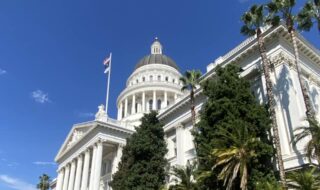June 23, 2025
July 1 changes ahead. Update on NFIB's legislative agenda
Welcome to the June 23-27 edition of the Main Street Minute from your small-business-advocacy team in Sacramento.
Taking Effect on July 1
The last two Main Street Minutes have prepared members for July 1 increases in gas, cannabis, tobacco, and local and district sales taxes (click here and scroll down to the You Have Two Weeks to Prepare section) and select state and local minimum wage increases (click here and scroll down to the Are You Ready for July 1? Select State and Local Minimum-Wage Rates Increasing section).
The San Francisco Chronicle has reported on other laws taking effect on July 1, which are not NFIB issues, but might be worth a glance. Topics in the newspaper’s list include Airbnb, pet insurance, and the CARE Act. However, one item on the list is related to NFIB’s No. 1 issue—the cost of health care.
“Most health insurance plans will now be required to cover infertility diagnoses and treatments, including in vitro fertilization. The mandate applies to both large and small group plans, though religious employers are exempt. (SB729).”
The No. 1 Issue?
In the above reference to health care being the No. 1 issue for NFIB-member small-business owners, a bit of qualifying is called for. And we’ll bet you know which state just had to be different.
NFIB’s quadrennial Small Business Problems & Priorities report has been ranking the 75 challenges to owning, operating, and growing a Main Street enterprise since 1982. And since 1986, the cost of health insurance has never fallen off the highest perch.
Last year’s release of the latest Small Business Problems & Priorities report broke the data down for four states (California, New York, Ohio, and Texas) and found the cost of health care still No. 1 in three of those states. Only in California did ‘Unreasonable Government Regulation’ take the title from the ‘Cost of Health Care,’ which fell to second place.
California’s ranking of regulations as No. 1 is worth pointing out to policymakers of how tarnished the Golden State has become as a place to open a business and keep it running.
The good news is even reliably hostile-to-business lawmakers, such as Assemblymember Buffy Wicks and Sen. Scott Wiener, are starting to worry about over-regulation. Wicks sponsored Assembly Bill 609, relaxing some California Environmental Quality Act (CEQA) regulations, and Wiener authored Senate Bill 607, curbing the use of environmental impact reports as a tactic to stall badly needed housing development.
Happy to report that both measures have been folded into the state budget, the quickest way to get something into law, which will take effect July 1.
NFIB Joins New Health Care Coalition
NFIB California is now part of a new health-care coalition, California Businesses for Affordable Health Care—and you can join too.
“California businesses—especially small and mid-sized employers—are working hard to offer health care coverage to their employees. But a growing number of state policy decisions are putting that commitment at risk,” says the CABAH website.
“CABAH brings together business groups and employers to urge lawmakers to oppose costly health care mandates that threaten businesses’ ability to offer health benefits to employees and their families.”
“Our Call to Lawmakers
— Vote no on all proposed health care mandate bills that increase premium costs
— Recognize the burden these policies place on employers and employees alike
— Focus on affordability and access – not costly mandates that threaten both.”
The Legislature
Now that all the news and noise surrounding the state budget has lowered from high to simmer, the Main Street Minute can return to some important policy updates as the Legislature’s July 18 summer recess approaches.
As a reminder, NFIB and its coalition partners had three huge successes in effectively, if not technically, killing three bad-for-business proposals.
— Senate Bill 222 (Wiener), a potential lawsuit wonderland allowing people to sue for problems they can relate to climate change as a result of fossil fuel products.
— Senate Bill 310 (Wiener), allowing for independent civil actions in wage-theft accusations.
— Senate Bill 799 (Allen), broadening use of the False Claims Act.
Not Done Yet
Of the 27 bills NFIB has categorized as the most potentially harmful for small businesses, eight are effectively, if not technically, dead. The remaining 19 are still alive and working their way through the opposite legislative chamber. From the 19, NFIB is adding a little extra opposition lobbying emphasis on four measures:
— Senate Bill 294 (Reyes), a proposed Workplace Know Your Rights Act requiring an employer to annually provide their employees with notifications of their workers’ rights under state and federal law.
— Senate Bill 464 (Smallwood-Cuevas), requiring employers to submit annual pay-data reports to the Civil Rights Department that includes employees’ race, ethnicity, and sex in specified job categories.
— Senate Bill 590 (Durazo), expanding paid leave eligibility for benefits to an employee who has the “equivalent of a family relationship.”
— Senate Bill 809 (Durazo), “which would provide that mere ownership of a vehicle … by a person in providing labor or services for remuneration does not make that person an independent contractor.”
Some Good News
Four bills good for small business out of the 21 NFIB targeted for support remain alive. They are:
— Assembly Bill 265 (Caloza) would establish the Small Business Recovery Fund Act.
— Senate Bill 70 (Seyarto) would increase the dollar amount under the Small Business Procurement and Contract Act.
— Senate Bill 84 (Niello) allowing 120 days to correct a violation.
— Senate Bill 690 (Caballero) on the processing of personal information.
As mentioned in prior Main Street Minutes, Assembly 609 (Wicks), exempting from CEQA requirement some housing development projects, and Senate Bill 607 (Wiener) curbing use of environmental impact reports as a delay tactic, were both folded into the state budget, which just passed the Legislature.
Update
NFIB recently added Assembly Bill 649 (Lowenthal) to its list of bad for small business bills. A measure making some specified documents available for public inspection, it also contains a Small Business Right to Cure program, which NFIB California Policy Director and bill-sniffing blood hound Tim Taylor isn’t buying.
“The right to cure portion is intentionally overly complex and unworkable,” said Taylor. “Also, it lets trial court attorneys off the hook for bringing frivolous lawsuits. The ‘right to cure’ language is meant to buy off business groups but I’m not taking the bait.”
Notes
There are 48 good and bad bills on NFIB’s list. With the Legislature’s ability to “gut and amend” legislation, no bill is ever technically dead until the end of session, which why we use the term “effectively if not technically dead.” The names in parentheses above are the main sponsors of the bills.
NFIB California in the News
Golden State Today, June 10—Media Metric’s umbrella publication for 73 local media outlets runs NFIB California’s news release on the latest Small Business Optimism Index readings.
Comstock’s, June Issue—NFIB California State Director John Kabateck briefly profiled as one the top association leaders in the know.
Calendar
— July 4: Independence Day. Legislature not in session
— July 18: Last day for policy committees to hear and report bills
— July 18: Summer recess begins upon adjournment
— July 24: 1 p.m. meeting with Assemblymember Juan Alanis for Stanislaus and Merced county-area NFIB members. Location to come.
— August 18: Legislature reconvenes from summer recess
— August 26: NFIB California’s Leadership Day at the Capitol
— August 29: Last day for fiscal committees to hear and report bills to the floor
— September 1: Labor Day. Legislature not in session
— September 12, 2025-January 5, 2026: Interim recess of the 2025-2026 session of the California State Legislature
— October 15: Last day for governor to sign or veto bills passed before September 12.
National
— Friday (June 20) saw a huge U.S. Supreme Court win for NFIB’s Small Business Legal Center, which filed an amicus brief in the case of Diamond Alternative Energy, LLC, et al. v. Environmental Protection Agency. “Small businesses have the right to challenge overreach by government agencies and seek relief from harmful regulatory actions,” said Beth Milito, Vice President and Executive Director of NFIB’s Small Business Legal Center, in a news release issued by NFIB. “The D.C. Circuit’s opinion set an unreasonable standard for plaintiffs to prove that the court can remedy their injury. This would have made it nearly impossible for indirectly regulated parties to challenge regulating agencies. NFIB applauds the Court for reversing the lower court’s opinion and ensuring that small businesses have a clear course of action and a fair chance at proving that the court can provide suitable relief.” More about the case can be found on the SCOTUSblog.
— NFIB launched a series of radio and digital ads in nine states and the District of Columbia last Tuesday, June 17, urging members of Congress to: Protect the privacy of small business owners by codifying into law President Trump’s order that American small businesses are exempt from the unconstitutional and invasive Beneficial Ownership Information (BOI) reporting rule; fully repeal the BOI law, and require the Financial Crimes Enforcement Network (FinCEN) to destroy all beneficial ownership information data already submitted by U.S. small businesses. California was not one of the states in the ad campaign. Listen to the radio ad here and visit ProtectSmallBusiness.org for up-to-date information on the campaign.
Next Main Street Minute: June 30. All Main Streets Minutes can be found on the NFIB website here. Pull down the California tab in the upper-right-hand corner.
NFIB is a member-driven organization advocating on behalf of small and independent businesses nationwide.
Related Articles














